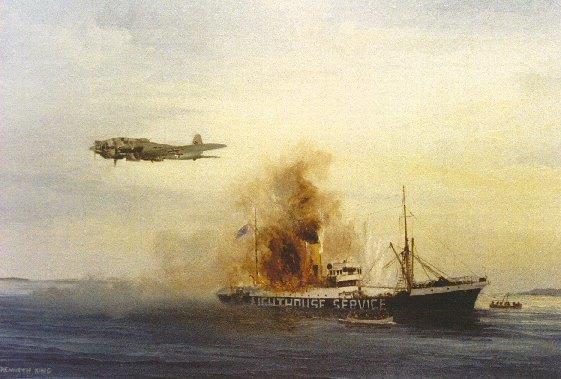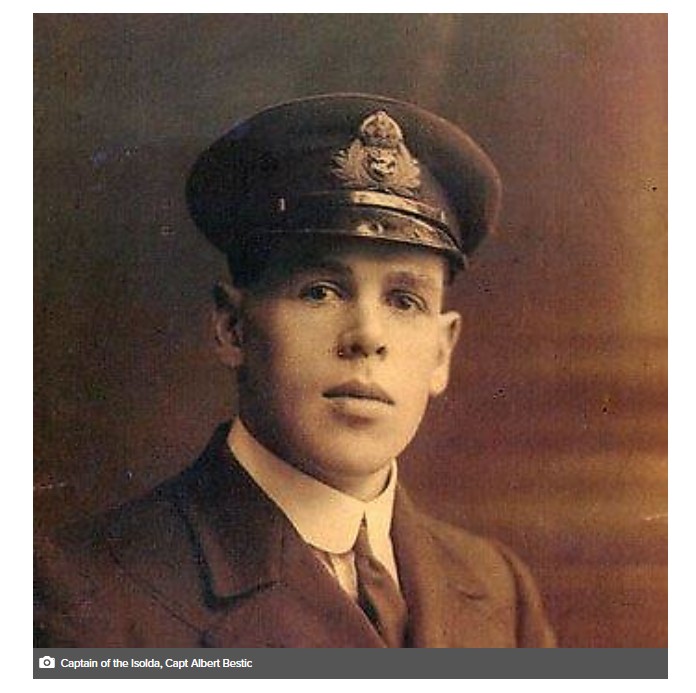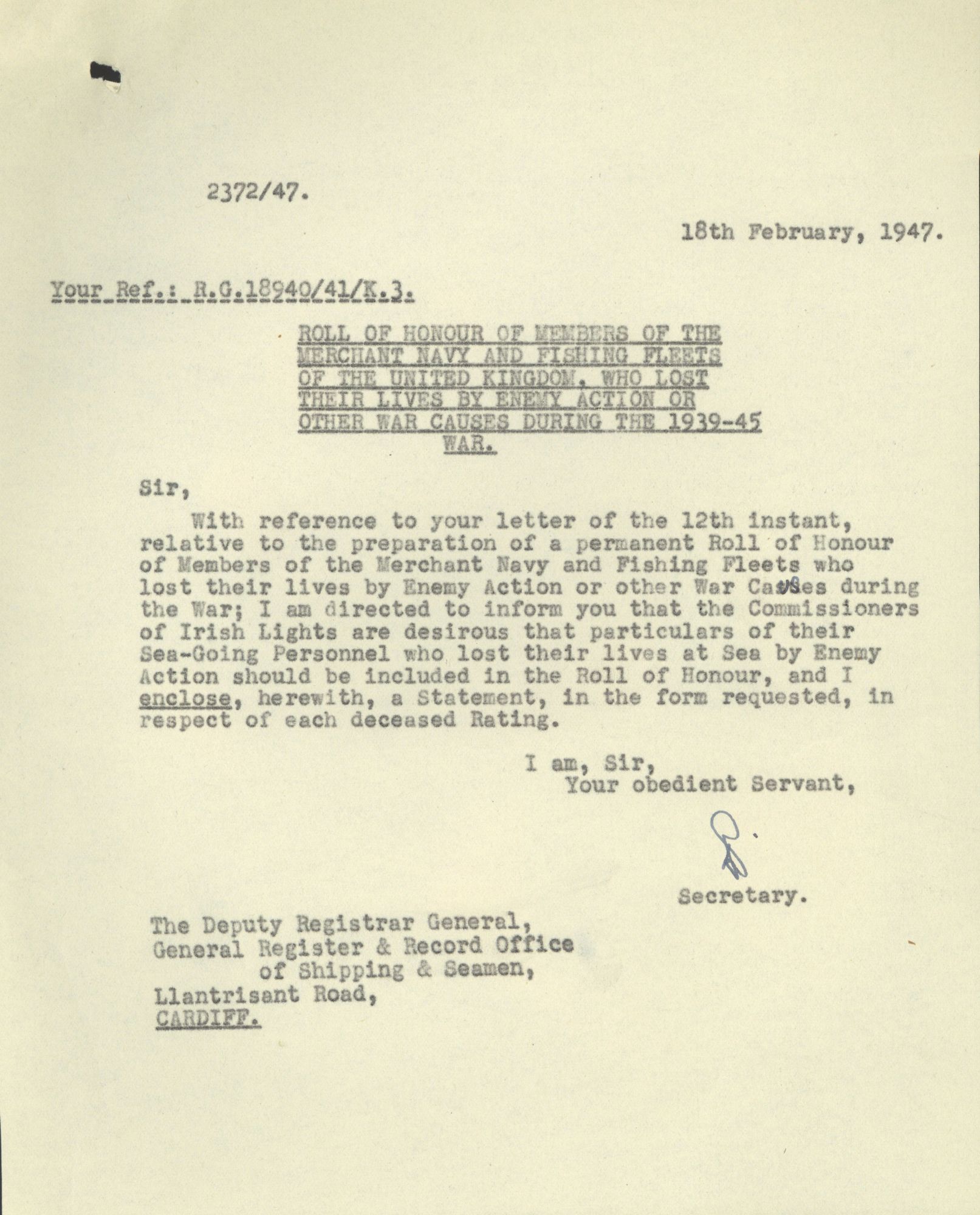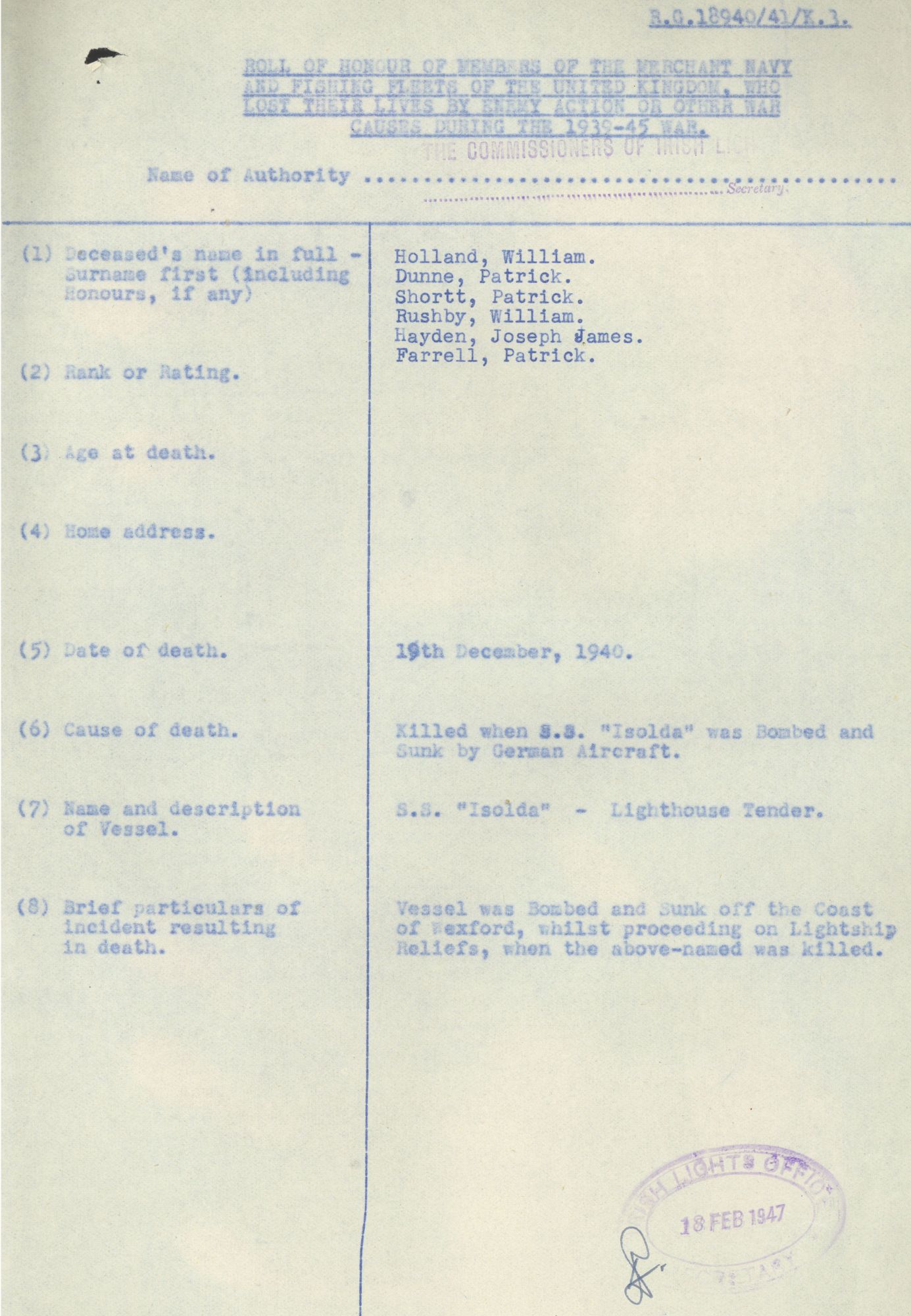It is reported that the aircraft circled three times over Isolda, and on the last pass released bombs, which hit the ship starting a fire. There were twenty-eight crew on board; tragically six men were killed in the bombing and seven wounded. The survivors landed at Kilmore Quay in their own lifeboats before the ship sunk in flames.

The Ship –SS Isolda being bombed – Painting by Kenneth King
“It with deep regret that this painful duty has fallen upon me and beg to report as follows. At 10.40am this date a plane was observed four miles N.E. of Station flying at a low altitude. The plane made for the S.S. “Isolda” at 10.43 a.m. two bombs were seen to drop into the sea close to her. She seemed to stop immediately and showed her starboard side to the bomber which was coming up on that side to attack. The words ‘Lighthouse Service’ on steamer’s side were visible from this station. At 10.50 a.m. a bomb struck “Isolda’s” fore deck. Smoke and flames shot skywards, and it seemed that she was on fire. Again, the bomber circled for position and dropped another two bombs at 10.54 a.m. which struck her bridge. Flames and heavy debris shot into the air. She then listed over to starboard and sank at 11.30 am 3 miles approximately East of Coningbeg Lightship. Three objects seen in the water close to her are believed to have been her boats. Smoke obscured them from being made out. [..] During the attack on the “Isolda” the Lightship’s lifeboat was lowered to rail and ratings wearing their lifebelts”.
(Irish Lights Archive. Ship Collection, Statement made by M.J. Doyle, Mate of Coningbeg Lightship, 19th December 1940)
In command of the Isolda was Captain Albert Bestic, the same person who was Junior Third Officer on RMS Lusitania, torpedoed off the Old Head of Kinsale on May 7th, 1915. Captain Bestic started his career in Irish Lights in 1922, when he was appointed 2nd Officer of the SS Alexandra; appointed 1st Officer of the SS Ierne in 1934; and 1st Officer of the SS Alexandra in 1939.

Captain Albert A. Bestic (photo: Kicking Canvas, by Albert A. Bestic, Evans Bros, 1957)
“I have to report that on the 19th instant at approximately 8.50 a.m. the vessel proceeded from Rosslare Harbour with Barrels and Coningbeg reliefs on board. At approximately 10.50 a.m. when the vessel was between two and a half to three miles E.N.E. of Coningbeg lightship, word was sent to my cabin by the second officer, who was on watch, that a plane was in sight. I immediately proceeded to the bridge and inquired if any markings on the plane had been distinguished.[..] The plane swept across the vessel from port to starboard approximately 70feet over the bridge, and dropped a bomb or bombs. It was my first intimation that he was an enemy. I knew that the ship had been severely damaged, as she slackened speed. The plane swept around in a circle, and I watched to see the angle of his approach. He came again from the sun, and I ordered “hard a port.”He passed over us, however, and dropped a second salvo before the ship answered to helm. [..] There was nobody else in sight when we left, and I am quite confident that we were the last remaining survivors. The water was searched before leaving the vicinity of the wreck for possible survivors, but no more could be found. [..].Six members of the crew are missing and, in accordance with the other evidence, I believe have been killed by the bombs [..]I estimate that the Isolda sank between fifteen and twenty minutes after we left her. I feel that the loss of life would have been greater had it not been for the coolness of the officers and crew in carrying out their orders”.
(Irish Lights Archive. Ship Collection, Statement made by M.J. Doyle, Mate of Coningbeg Lightship, 19th December 1940)
Those who lost their lives due to enemy action are honoured and acknowledged for their loyal and dedicated service:
Patrick Dunne; Coxwain, Dun Laoghaire, aged 46
Patrick Farrell; AB, Dun Laoghaire, aged 24
Jimmy (Joseph James) Hayden; Fireman, DunLaoghaire, aged 38
William Holland; Chief Steward, Dun Laoghaire, aged 58
William Rushby, Leading Fireman, Dun Laoghaire, aged 43
Paddy (Patrick) Shortt; Fireman, Dun Laoghaire, aged 44
May they rest in peace.

Irish Lights Archive, MP/1/6/1476, General Register and Record Office of Shipping and Seamen- Roll of Honour, February 1947

Irish Lights Archive, MP/1/6/1476, General Register and Record Office of Shipping and Seamen- Roll of Honour, February 1947
These lighthouse tenders maintained, supported, and provided supplies to the lighthouses and lights vessels around the Irish coasts and facilitated crew changes. Though Ireland maintained neutrality during the war, its maritime workers were not immune to violence, and this incident underscores the vulnerability of neutral vessels.
“In normal times we would have come together to commemorate the 80th anniversary of the sinking of the Isolda. On this occasion, we have prepared a short video to mark the anniversary and pay our respects to those involved. This was a deeply sad day in the history of Irish Lights. The incident highlights the dangers encountered by Irish Lights and its personnel in the course of its long history. Our thoughts are with our former colleagues who lost their lives and with their families”
(Yvonne Shields O’Connor, CEO, Irish Lights, Isolda Commemoration19th December 2020).
It is a deeply moving part of Ireland's maritime history. The Isolda's story will be remembered particularly for its civilian nature and the bravery of those aboard. Their memory is honoured to this day by Irish Lights, whose employees continue to serve with the same quiet dedication.
